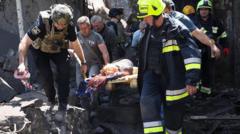While Russian media paint a picture of recovery in Mariupol, local residents insist that the reality is far grimmer, with continued destruction, critical shortages, and a creeping propaganda machine targeting education.
"Mariupol's Struggle: Reality Clash with Russian Narratives"

"Mariupol's Struggle: Reality Clash with Russian Narratives"
Residents of Mariupol provide a stark contrast to Russian claims of normalcy, revealing ongoing hardships and the plight of living under occupation.
Ukrainian residents of the war-torn city of Mariupol are speaking out against the contrasting narratives put forth by Russian state media, which claim the city is returning to normalcy. "What they're showcasing on Russian television is pure fiction," asserts John, a Mariupol local who, for safety reasons, has chosen to conceal his name. He observes, "They fix up the facades on main streets for the cameras, but away from the spotlight lies devastation." A bitter reminder of Russia's brutal siege that began three years ago, Mariupol continues to bear scars, with the UN estimating that around 90% of its residential buildings were either damaged or obliterated.
Despite alterations made in select areas of the city, residents report that infrastructure remains insufficient. "We had a beautiful city but now it's sick," comments Olha Onyshko, a refugee who fled the devastation. She highlights that while some buildings have undergone superficial repairs, many residents are still living in half-demolished homes. The ongoing water crisis is particularly alarming, with intermittent supply and water deemed unsafe for consumption. "It looks like 'coca cola'," reveals James, a local resident, emphasizing the vital need for basic drinking water.
Scarcity extends beyond water; basic medicines are hard to procure, particularly for chronic conditions. Power outages are common, and food costs are high, fostering grave concerns for residents' well-being. Interactions with schools reveal that children are being indoctrinated with propaganda, notes Andrii Kozhushyna, a former Mariupol student. Educational materials convey distorted histories and promote narratives that glorify Russian military operations, escalating a cultural clash amidst the occupation.
Yet, amidst oppression, a form of resistance endures. Locals have taken to clandestinely expressing Ukrainian pride, painting pro-Ukrainian slogans throughout the city. James, a participant in these resistance activities, cites their goal as two-fold: to uplift the morale of fellow Ukrainians and to gather intelligence on Russian military maneuvers. "Every little action counts," he signals, recounting the risks involved with documenting vital information under the watchful eyes of occupying forces.
As the specter of diplomatic negotiations looms, there's growing concern that the plight of people like those in Mariupol may be overlooked in any land concessions. John voices a sentiment many share among those fighting for liberation: "We demand freedom, not a peace that costs us our homeland." Thus, as the conflict persists, Mariupol remains a symbol of resilience against the overwhelming force of occupation and propaganda.




















